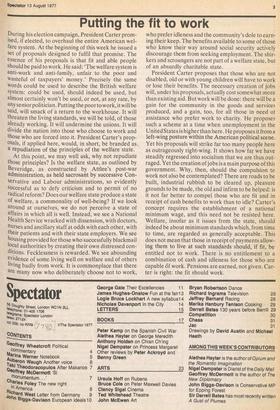Putting the fit to work
During his election campaign, President Carter promised, if elected, to overhaul the entire American welfare system. At the beginning of this week he issued a set of proposals designed to fulfil that promise. The essence of his proposals is that fit and able people should be paid to work. He said: 'The welfare system is anti-work and anti-family, unfair to the poor and wasteful of taxpayers' money.' Precisely the same words could be used to describe the British welfare System: could be used, should indeed be used, but almost certainly won't be used, or not, at any rate, by any senior politician. Putting the poor to work, it will be said, will smack of 'a return to the workhouse. It will threaten the living standards, we will be told, of those already working. It will undermine the unions. It will divide the nation into those who choose to work and those who are forced into it. President Carter's proposals, if applied here, would, in short, be branded as. a repudiation of the principles of the welfare state.
At this point, we may well ask, why not repudiate those principles? Is the welfare state, as outlined by Beveridge, as constructed by Attlee's post-war administration, as held sacrosant by successive Conservative and Labour administrations, so evidently successful as to defy criticism and to permit of no radical reform? Does our welfare state produce a state Of welfare, a commonality of well-being? If we look around at ourselves, we do not perceive a state at affairs in which all is well. Instead, we see a National Health Service wracked with dissension, with doctors, nurses and ancillary staff at odds with each other, with their patients and with their state employers. We see housing provided for those who successfully blackmail local authorities by creating their own distressed conditions. Fecklessness is rewarded. We see abounding evidence of some living well on welfare and of others living badly from work. It is commonplace that there are many now who deliberately choose not to work, who prefer idleness and the community's dole to earning their keep. The benefits available to some of those who know their way around social security actively discourage them from seeking employment. The shirkers and scroungers are not part of a welfare state, but of an absurdly charitable state.
President Carter proposes that those who are not disabled, old or with young children will have to work or lose their benefits. The necessary creation of jobs will, under his proposals, actually cost somewhat more than existing aid. But work will be done: there will be a gain for the community in the goods and services produced, and a gain, too, for all those in need of assistance who prefer work to charity. He proposes such a scheme at a time when unemployment in the United States is higher than here. He proposes it from a left-wing posture within the American political scene. Yet his proposals will strike far too many people here as outrageously right-wing. It shows how far we have steadily regressed into socialism that we are thus outraged. Yet the creation of jobs is a main purpose of this government. Why, then, should the compulsion to work not also be contemplated? There are roads to be built, industrial rubbish to be cleared up, pleasure grounds to be made, the old and infirm to be helped: is it not far better to compel those who are fit and in receipt of cash benefits to work than to idle? Carter's concept requires the establishment of a national minimum wage, and this need not be resisted here. Welfare, insofar as it issues from the state, should indeed be about minimum standards which, from time to time, are regarded as generally acceptable. This does not mean that those in receipt of payments allowing them to live at such standards should, if fit, be entitled not to work. There is no entitlement to a combination of cash and idleness for those who are capable of work. Pensions are earned, not given. Carter is right: the fit should work.


































 Previous page
Previous page